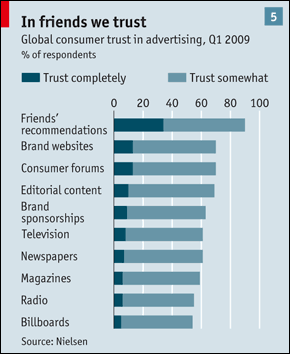February 4, 2010
| Article | Advertising
Social Networks Trading in Trust
By now, skepticism about the revenue potential of today's most popular social networking sites is a well known bromide. Sure, the doubters say, go ahead and push your membership and your traffic into the stratosphere, but, in the end, how does that make you money? Translating usage and eyeballs into dollars: it's a problem facing the likes of Twitter, Facebook, and every other star in the social universe.
But a report from the most recent issue of the Economist argues otherwise, pointing out that social network advertising is not only growing in importance, but also effectiveness:
Why are the networks becoming more popular when their click-through rates are so low? One reason is that advertisers are being drawn to the leading sites by their sheer scale. 'Facebook's audience is bigger than any TV network that has ever existed on the face of the earth,' says Randall Rothenberg, the head of the Interactive Advertising Bureau (IAB).... The other reason more money is heading the networks' way is that some advertisers are seeing a great return on their investment.
While the Economist article focuses mostly on the growth potential of advertising on social networks, it also includes a telling graph that speaks to the entire field of online reputation management. Take a look:

What jumps out there to me is the incredible relative strength of online sources as compared to traditional advertising. Clearly, "friends recommendations" dominates the chart, and that's an indication of how important viral messaging can be. But brand websites, community forums, and editorial content are all also found online and subject to the rules of ORM.
The lesson I'm taking away from the Economist's study is that everything we do in the world of ORM has a significant impact on people, and is essential in building trust with the consumer.